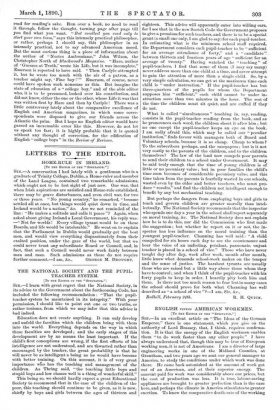THE NATIONAL SOCIETY AND THE PUPIL. TEACHERSYSTEM.
[To THE EDITOR OF THE " SPECTATOR."'
STR,—I learn with great regret that the National Society, in its advice to the Government about the forthcoming Code, has included the following recommendation : "That the pupil- teacher system be maintained in its integrity." With your permission, I should like to point out one or two truths, or rather truisms, from which we may infer that this advice is bad indeed.
Education does not create anything. It can only develop and unfold the faculties which the children bring with them into the world. Everything depends on the way in which these faculties are developed ; and the early stages of this development are by no means the least important. If the child's first conceptions are wrong, if the first efforts of his intelligence are not understood, and are thwarted rather than encouraged by the teacher, the great probability is that he will never be as intelligent a being as he would have become with better training. On this account, it is of very great importance wrfo has the teaching and management of the children. As Thring said, "the teaching little boys and stupid boys and low classes well is a thing of wonderful skill."
This being so, we should hardly expect a great Educational Society to recommend that in the case of the children of the poor, this teaching should continue to be given, as it is now, chiefly by boys and girls between the ages of thirteen and
eighteen. This advice will apparently enter into willing ears, for [see that in the new Scotch Code the Government proposes to give a premium for such teachers, and there is to be a special grant (a small one only, I am glad to say) for each pupil-teacher. In estimating what is the minimum school staff required, the Department considers each pupil-teacher to be " sufficient for an average attendance of forty," and a "candidate' between thirteen and fourteen years of age "sufficient for an average of twenty." Having watched the " teaching " of pupil-teachers, I find that some of them (I may say many) never address more than one child at a time, and never attempt - to gain the attention of more than a single child. So, by a very simple calculation, we can get at the maximum time each child is "under instruction." If the pupil-teacher has but three-quarters of the pupils for whom the Department supposes him "sufficient," each child cannot be under in- struction more than two minutes in the hour. The rest of the time the children must sit quiet, and are cuffed if they do not.
What is called " simultaneous " teaching in, say, reading, consists in the pupil-teacher reading from the book, and as he pronounces each word, the children shout it after him ; but no one except the pupil-teacher keeps an eye on the book. I am sadly afraid this, which may be called our "peculiar institution," finds favour with managers both of Board and Voluntary schools, because it is so cheap. Cheap to whom ? To the subscribers perhaps, and the ratepayers ; but is it not very costly to the parents of the children, and to the children themselves ? The law of the land now compels poor parents to send their children to a school under Government. It may be said truly enough that the time of young children is of little or no pecuniary value ; but in poor families the child's time soon becomes of considerable pecuniary value, and this time taken from the parents is fearfully wasted in our schools, wasted even by the older and better teachers, who must pro- duce "results," and find the children not intelligent enough to benefit by any but mechanical teaching.
But perhaps the dangers from employing boys and girls to teach and govern children are greater morally than intel- lectually. The National Society recommends that the inspector who spends one day a year in the school shall report separately on moral training, &c. The National Society does not explain how he is to do this, nor did the Commission who first made the suggestion ; but whether he report on it or not, the in- spector has less influence on the moral training than the youngest pupil-teacher. Channing has well said : "A child compelled for six hours each day to see the countenance and hear the voice of an unfeeling, petulant, passionate, unjust teacher is placed in a school of vice." Those who have never taught day after day, week after week, month after month, little know what demands school-work makes on the temper and the sense of justice. The harshest tyrants are usually those who are raised but a little way above those whom they have to control ; and when I think of the pupil-teacher with his forty pupils to keep in order, I heartily pity both him and them. Is there not too much reason to fear lest in many cases the school should prove for both what Channing has well described as "a school of vice "?—I am, Sir, &c.,






































 Previous page
Previous page